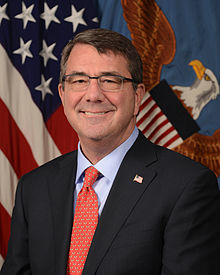
Back آشتون كارتر Arabic آشتون كارتر ARZ اشتون کارتر AZB Эштан Картэр Byelorussian Ashton Carter Catalan ئەشتۆن کارتەر CKB Ashton Carter Czech Ashton Carter German Ashton Carter Spanish Ashton Carter Estonian
Ash Carter | |
|---|---|
 Official portrait, 2015 | |
| 25th United States Secretary of Defense | |
| In office February 17, 2015 – January 20, 2017 | |
| President | Barack Obama |
| Deputy | Robert O. Work |
| Preceded by | Chuck Hagel |
| Succeeded by | Jim Mattis |
| 31st United States Deputy Secretary of Defense | |
| In office October 6, 2011 – December 4, 2013 | |
| President | Barack Obama |
| Secretary |
|
| Preceded by | William J. Lynn III |
| Succeeded by | Christine Fox (acting) |
| Under Secretary of Defense for Acquisition, Technology and Logistics | |
| In office April 27, 2009 – October 5, 2011 | |
| President | Barack Obama |
| Preceded by | John J. Young Jr. |
| Succeeded by | Frank Kendall III |
| Assistant Secretary of Defense for Global Strategic Affairs | |
| In office June 30, 1993 – September 14, 1996 | |
| President | Bill Clinton |
| Preceded by | Stephen Hadley |
| Succeeded by | Jack Dyer Crouch II (2001) |
| Personal details | |
| Born | Ashton Baldwin Carter September 24, 1954 Philadelphia, Pennsylvania, U.S. |
| Died | October 24, 2022 (aged 68) Boston, Massachusetts, U.S. |
| Political party | Democratic[1] |
| Spouses |
|
| Relations | Cynthia DeFelice (sister) |
| Children | 2 |
| Education | |
| Signature |  |
| Academic background | |
| Thesis | Hard processes in perturbative QCD (1979) |
| Doctoral advisor | Christopher Llewellyn Smith |
Ashton Baldwin Carter (September 24, 1954 – October 24, 2022) was an American government official and academic who served as the 25th United States secretary of defense from February 2015 to January 2017. He later served as director of the Belfer Center for Science & International Affairs at Harvard Kennedy School.[3]
Carter began his career as a physicist. After a brief experience as an analyst for the Congressional Office of Technology Assessment, he switched careers to public policy. He joined the Kennedy School of Government at Harvard University in 1984 and became chair of the International & Global Affairs faculty.[4] Carter served as Assistant Secretary of Defense for International Security Policy during President Clinton's first term, from 1993 to 1996, responsible for policy regarding the former Soviet states, strategic affairs, and nuclear weapons.
During President Obama's first term, he served first as Under Secretary of Defense for Acquisition, Technology and Logistics and then Deputy Secretary of Defense until December 2013. In February 2015, he replaced Chuck Hagel as Secretary of Defense and served until the end of the Obama administration.[5] During his tenure, he ended the ban of transgender officers in the military. In 2016, Carter opened all military occupations and positions to women without exception. This marked the first time in U.S. history that women with the appropriate qualifications would be allowed to serve in military roles such as infantry, armor, reconnaissance, and special operations units.[6]
For his service to national security, Carter had on five occasions been awarded the DOD Distinguished Public Service Medal. He had also received the CJCS Joint Distinguished Civilian Service Award, and the Defense Intelligence Medal for his contributions to intelligence. Carter was author or co-author of eleven books and more than 100 articles on physics, technology, national security, and management.[7]
- ^ Cite error: The named reference
NYTDemocratwas invoked but never defined (see the help page). - ^ Cite error: The named reference
cnnlibrarywas invoked but never defined (see the help page). - ^ Cite error: The named reference
Belfer Centerwas invoked but never defined (see the help page). - ^ Cite error: The named reference
Belfer Center Profilewas invoked but never defined (see the help page). - ^ Cite error: The named reference
Historical Officewas invoked but never defined (see the help page). - ^ Cite error: The named reference
Defense Openwas invoked but never defined (see the help page). - ^ Cite error: The named reference
FPRIwas invoked but never defined (see the help page).
© MMXXIII Rich X Search. We shall prevail. All rights reserved. Rich X Search